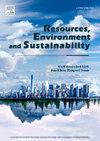Comprehensive reviews on technological and life cycle environmental aspects of solar–thermal adsorption refrigerator
IF 12.4
Q1 ENVIRONMENTAL SCIENCES
引用次数: 0
Abstract
Refrigeration has significantly enhanced human well-being but comes with notable environmental impacts, particularly due to ozone-depleting substances and hydrofluorocarbons with high global warming potential. Solar Thermal Adsorption Refrigeration (STAR) has emerged as a promising alternative, especially in rural and off-grid regions where conventional refrigeration systems face energy limitations. This paper provides a comprehensive review of recent advancements in adsorption refrigeration technologies, including novel adsorbents like activated carbon–ethanol, metal–organic frameworks (MOFs), and composite materials designed to overcome critical challenges in heat and mass transfer. A particular emphasis is placed on the size limitations of adsorbers and the thermal efficiency of working pairs. Additionally, we critically analyze the life cycle environmental impacts of adsorption refrigeration systems, evaluating their sustainability compared to conventional vapor compression technologies. Unlike previous reviews, this paper integrates both technological developments and life cycle assessments, offering a unique perspective on STAR’s viability for sustainable refrigeration solutions. Finally, we present two novel bench-scale STAR systems, compare their environmental performance to traditional systems, and highlight key design improvements that address scalability challenges.

太阳能热吸附式制冷机技术及全生命周期环境研究综述
制冷大大提高了人类的福祉,但也带来了显著的环境影响,特别是由于臭氧消耗物质和具有高全球变暖潜力的氢氟碳化合物。太阳能热吸附制冷(STAR)已成为一种有前途的替代方案,特别是在农村和离网地区,传统制冷系统面临能源限制。本文综述了吸附式制冷技术的最新进展,包括活性炭-乙醇等新型吸附剂、金属-有机框架(mof)和复合材料,旨在克服传热传质方面的关键挑战。特别强调的是吸附剂的尺寸限制和工作对的热效率。此外,我们批判性地分析了吸附制冷系统的生命周期对环境的影响,与传统蒸汽压缩技术相比,评估了其可持续性。与之前的评论不同,本文整合了技术发展和生命周期评估,为STAR可持续制冷解决方案的可行性提供了独特的视角。最后,我们提出了两种新型的实验规模STAR系统,比较了它们与传统系统的环境性能,并强调了解决可扩展性挑战的关键设计改进。
本文章由计算机程序翻译,如有差异,请以英文原文为准。
求助全文
约1分钟内获得全文
求助全文
来源期刊

Resources Environment and Sustainability
Environmental Science-Environmental Science (miscellaneous)
CiteScore
15.10
自引率
0.00%
发文量
41
审稿时长
33 days
 求助内容:
求助内容: 应助结果提醒方式:
应助结果提醒方式:


